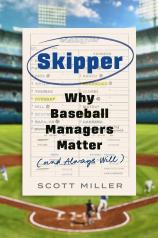Skipper: Why Baseball Managers Matter and Always Will
Review
Skipper: Why Baseball Managers Matter and Always Will
It used to be that managing in baseball was like most other professions. You started at the bottom (in the minors) and worked your way up. You might go from one team to another --- Billy Martin and Leo Durocher immediately come to mind --- but once you reached the top, you pretty much stayed there. They were intimidating presences with a “my way or the highway” credo. They weren’t concerned about players’ feelings or placating an ever increasingly hostile media.
That’s no longer the case. The days of the long-time manager may be over. Bruce Bochy, who is currently managing the Texas Rangers, has been around since 1995 and might be the last of his kind. Dave Roberts has led the Los Angeles Dodgers to first-place finishes in the NL West in all but one of his 10 seasons there. Aaron Boone has “only” been with the Yankees since 2018, but that should count for more since New York is the media capital of the world, which adds an extra layer of complications.
More and more, you have skippers who have no minor league background, leading fans and members of the media to question their qualifications. In this new paradigm, managers are called on to juggle many roles: field general, public relations handler, guidance counselor, father confessor.
"Miller does a thoughtful job in presenting multiple historical and current scenarios, bridging different generations and tactics, from both playing and financial aspects."
Since Michael Lewis published MONEYBALL: The Art of Winning an Unfair Game more than 20 years ago, statistics seem to have taken over how decisions are made, with new numbers ousting what were considered deciding factors just a few years ago. Batting average has been supplanted by OPS (on-base plus slugging percentage) as a determinant. Pitchers are no longer expected to run through the lineup more than three times, with “spin rate” and velocity carrying great weight over being able to throw multiple innings.
Such modifications haven’t been seamless. Baseball is steeped in tradition, and not everyone is happy with change. The pandemic brought about a few adjustments, including starting extra innings with a runner already on second base, to the consternation of many fans. (There’s a famous scene in the movie version of MONEYBALL in which a group of crusty old veteran scouts are informed about the new systems, and their response is expected: “But it’s always been done this way.”)
Over the past couple of decades, ownership has moved heavily into that MONEYBALL model, using more resources for data analysis to the extent that one wonders when the day will come that you just input all the data --- pitcher vs. batter, game site, weather conditions, climate, etc. --- and have a computer spit out the “perfect” lineup.
According to Scott Miller, a veteran baseball writer for several outlets, there were a few forward-thinkers who used primitive forms of data analysis, such as the Baltimore Orioles Hall of Fame maestro, so wonderfully portrayed in John W. Miller’s THE LAST MANAGER: How Earl Weaver Tricked, Tormented, and Reinvented Baseball. Earl Weaver, who was inducted into the Baseball Hall of Fame in 1996, kept detailed handwritten index cards with batter-pitcher matchups in the years before personal computers were even a thing.
Teams are now multi-billion-dollar enterprises, and ownership has little patience for poor showings. Add to that sports media coverage, with dissatisfied fans always wanting to get rid of under-performing managers, and the pressure to produce --- given all the resources available --- can be brutal. Since you can’t fire 25 players, to borrow the title of a book written by Alvin Dark and John Underwood, WHEN IN DOUBT, FIRE THE MANAGER. (Dark, a long-time, old-school type who split 13 seasons at the helm of five different teams, was at the center of a controversy in the 1960s when he complained about the lack of discipline and even intelligence of the Spanish-speaking players on his San Francisco Giants.)
In SKIPPER: Why Baseball Managers Matter and Always Will, Miller does a thoughtful job in presenting multiple historical and current scenarios, bridging different generations and tactics, from both playing and financial aspects. He may be right when he claims that managers will always matter. But given the direction in which the game has been heading since the turn of the 21st century, will that continue to be the case? Will one man (there are actually a couple of women leading teams in the low minor leagues right now) be the ultimate authority, or will the front office shift to their increasingly powerful analytics departments to make decisions?
Reviewed by Ron Kaplan (www.RonKaplansBaseballBookshelf.com) on May 31, 2025
Skipper: Why Baseball Managers Matter and Always Will
- Publication Date: May 13, 2025
- Genres: Nonfiction, Sports
- Hardcover: 400 pages
- Publisher: Grand Central Publishing
- ISBN-10: 0306832704
- ISBN-13: 9780306832703



